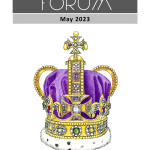Thought for the Week – 21st May 2023
On Doors
We recently had a visit from the church architect at Billingsley, which coincided with a person updating a book on Shropshire churches. We spent a few minutes admiring the rather fine Norman-style door and the splendid, perhaps medieval, wooden porch at Billingsley. There is prayer dating from the late 8th century that a Saxon cleric named Alcuin apparently fixed over the door of one his churches; It reads –
“This is the gate of heaven, the door of eternal life: it leads the traveller towards the stars. On entering, a person may penetrate the heavenly mountain, if he takes with him faith and hope as his companions. Here forgiveness may be sought, if the pilgrim enters with a devout heart, and on foot. Here also a sinner may shed his evil acts and with tears wash this sacred threshold. Then purged by tears of repentance and adorned with humility, he is worthy to enter the holy places of God. I believe that Jesus in his mercy forgives their sins, so that whoever enters sad will emerge more joyful.”
I like it and have toyed with displaying it on some of the church doors in our benefice. But, on rereading it, I was struck by some words of the late Bishop John Robinson, which I have also recently featured. John pointed out the dwelling place of God is not the church, either as a building or even as the company of believers; it tis the world. With that in mind, should Alcuin’s prayer be on the outside of the door to welcome people into a building, or on the inside to challenge visitors as they leave?
Rev David Poyner
Thought for the Week – 14th May 2023
The Swords
It seems that an unexpected star of the coronation last weekend was the Lord President of the Council, Penny Mordaunt who spent the best part of two hours holding up various swords. She was a striking figure, always present in the corner of the television pictures. I was however also fascinated by the swords themselves and their associated symbolism. For me, the most intriguing was the Sword of Offering. This was blessed by the Archbishop who asked that it be a symbol of justice and mercy, not judgement and might. As he handed it to the King, he told him to do justice and stop evil, protect the church, defend the week and to punish wrong-doing. It was then placed back on the altar before Penny Mordaunt redeemed it by paying 100 shillings; she then carried it for the rest of the service. I do not fully understand all the symbolism but I suspect at its heart is a recognition that anyone in authority must make difficult decisions, often having to pick the lesser of several evils. The swords may reflect a pre-Christian practice in the coronation, but the Bible also reflects the tension between showing mercy and doing justice, loving enemies and protecting the week. Perhaps the payment of the redemption money to the altar has something to do with recognising that we are all fallen and need the mercy of God, the ultimate redeemer. The power a ruler exercises is only ever borrowed from God and they will need wisdom from God in doing that; humility and forgiveness when they get it wrong.
Of course, King Charles does not exercise political power, that belongs to politicians, like Penny Mordaunt. And when they sit in the House of Lords, the Bishops are also inevitably entering into politics, albeit trying to bring a spiritual perspective. And so this week, we saw the dilemma of the swords being acted out in the House of Lords; arguments on immigration, picking the least bad option, how to juggle truth and love. That needs wisdom on how to use the swords.
Rev David Poyner
Thought for the Week – 7th May 2023
The Coronation
My guess is that most people will spend at least some time this weekend watching the coronation, either live or highlights. Amidst all the pomp and celebrations, they will see a service in a church, because that is at the centre of the coronation. They will be watching a ceremony that can trace its Christian roots back to the 5th century, when the Patriarch of Constantinople would place a crown on the head of Eastern Roman emperor. But the service itself has roots well over a thousand years previous to that, borrowing words and symbols from the enthronement of the kings of the Bible. The king was seen as a person to represent God’s rule over the nation of Israel and so given authority. However, it was clearly understood that this authority was conditional on the ruler following God’s law; he was to be just and merciful, to defend the weak. The coronation was actually a contract, between the king, his subjects and God.
The three-way contract underlies the current coronation. We, as subjects of King Charles, have obligations to his representatives who govern us; it follows from this that we have responsibilities to each other. Charles is given authority, delegated to politicians and state officials, to rule, but this depends on just and fair administration of the law. And behind our and his rights and responsibilities lies God, the one who is wholly trustworthy and wholly love. The coronation reminds us that Charles and ourselves are accountable to the King of kings, the Lord of lords and the only Ruler of princes.
Perhaps there are some rulers who would do well to watch the coronation and be reminded themselves of the one to whom they must ultimately answer for their doings.
Rev David Poyner
Highley Forum – May 2023
Thought for the Week – 23rd April 2023
What are is Faith?
This musing is based by an article in the Church Times by Andrew Brown. He begins by quoting the journalist Camilla Cavendish on her planned attendance at an Easter service.
“I will be going to church this Sunday, despite not believing in the resurrection. I’ll be there to accompany an elderly relative, but also for a dose of ritual and rhythm, to sing with strangers and to be able to quietly reflect on things outside myself. It occurs to me that I seek similar benefits from yoga and mindfulness, both of which have their roots in eastern faiths. The much-vaunted decline of religion is perhaps not quite what it seems. We avidly read self-help books telling us we will be happier if we express gratitude but have lost the rituals which enabled us to do that. We mourn the loss of community but are unsure how to reconstruct it. I envy my Jewish and Muslim friends… That doesn’t mean I want to spend hours being preached at… But it does seem unfortunate to have reached a position of either having to embrace every aspect of a faith or else denigrate it”
I’m not sure I understand what it means to embrace “every aspect” of Christianity; my own faith comes from questioning it and accepting that often there are no simple answers. But, like Camilla, in the ritual and rhythm, I find something that speaks to me; as Andrew Brown comments, something that enters into me and resonates with me. As he puts it, the more it enters into me, the harder it can be to explain it, although I am driven to do that. But in that process, I encounter mystery; I do not embrace it, somehow, it embraces me.
Thought for the week, 29th April; Love bade me welcome
This poem, technically known as Love (III) is by George Herbert, a 17th century priest. I first met it as an undergraduate and 40 years later it still speaks to me.
LOVE bade me welcome; yet my soul drew back,
Guilty of dust and sin.
But quick-eyed Love, observing me grow slack
From my first entrance in,
Drew nearer to me, sweetly questioning
If I lack’d anything.
‘A guest,’ I answer’d, ‘worthy to be here:’
Love said, ‘You shall be he.’
‘I, the unkind, ungrateful? Ah, my dear,
I cannot look on Thee.’
Love took my hand and smiling did reply,
‘Who made the eyes but I?’
‘Truth, Lord; but I have marr’d them: let my shame
Go where it doth deserve.’
‘And know you not,’ says Love, ‘Who bore the blame?’
‘My dear, then I will serve.’
‘You must sit down,’ says Love, ‘and taste my meat.’
So I did sit and eat.
Rev David Poyner

